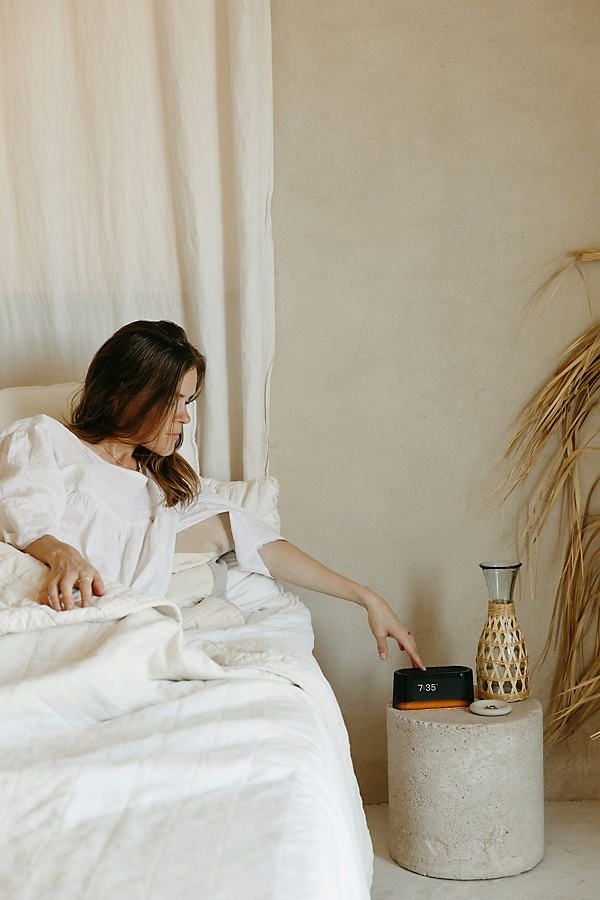A GUIDE TO WAKING UP BETTER
It seems like everyone is having a hard time getting a good night’s sleep because…well, everything. It’s not even just a good night’s sleep but just not waking up like a total trainwreck. Waking up refreshed and ready to tackle the day isn’t just about the moment your alarm goes off. It starts with what you do the night before, how you ease into your morning, and the overall wellness habits you build. By making even the smallest, intentional changes to your day and wellness routine, you can transform the way you start your day. Here are a few strategies I’ve been trying in order to impact my energy, focus, and overall well-being.
Set Yourself Up for Restful Sleep
Swap Blue Light for Red Light
Exposure to blue light from phones, laptops, and TVs can interfere with your body’s natural production of melatonin, the hormone responsible for sleep. This artificial light tricks your brain into thinking it’s still daytime, delaying the sleep cycle and making it harder to fall asleep. Instead, opt for red light before bed, which can help regulate your circadian rhythm and improve both sleep quality and next-day energy. Red light wavelengths signal to your body it’s time to wind down, promoting melatonin production naturally. Try using red light bulbs in your bedroom, meditating in front of a red light device, or reading a book instead of scrolling on your phone before bed. Even dimming your lights an hour before sleep can make a significant difference. The easiest way is to swap out regular bedside lamps with LED lightbulbs that change colors to create a sleep-friendly environment.
Brain Dump Before Bed
If your mind races at night, writing down your thoughts can help you offload mental clutter and prepare for sleep. The brain processes a lot throughout the day, and bedtime is often the first opportunity to reflect. This can lead to overthinking, stress, and anxiety that interfere with restful sleep. Taking 15 minutes to jot down your to-do list, lingering thoughts, or anything causing worry can help clear your mind and make it easier to relax. This practice reassures the brain that nothing important will be forgotten and allows a transition into a calmer state. Some people prefer structured journaling, while others benefit from freewriting whatever comes to mind. The easiest way to bring this into practice is to keep a notebook by your bed to make brain-dumping a nightly habit for better mental clarity.
Manifest While You Sleep
Our subconscious minds are most receptive to new ideas as we drift off to sleep. Instead of falling asleep to TV reruns, try guided meditation or manifestation affirmations. Research suggests that listening to positive affirmations or visualization exercises before bed can rewire your mindset and influence your daily habits. Many successful individuals use sleep-focused manifestation techniques to shift their mindset, boost confidence, and overcome limiting beliefs. Consider using an app or a playlist with guided affirmations to reinforce positive thinking. If audio just isn’t your thing, try writing down goals and reviewing them just before sleep. The subconcious absorbs information better when you are in a relaxed state, making bedtime the ideal opportunity to reinforce new habits and beliefs.
Keep Your Nighttime Routine Consistent
A structured nighttime routine signals to your body that it’s time to wind down. Your body craves consistency, and performing the same set of activities before bed helps regulate your internal clock. Whether it’s a skincare ritual, reading, or meditation, repeating these actions every night creates strong associations with sleep. Studies have shown that people with predictable nighttime habits tend to fall asleep faster and wake up feeling more refreshed. Avoid stimulating activities like intense exercise or working late into the night, as these can keep your brain active. Instead, focus on calming activities like stretching, light reading, or deep breathing exercises. To keep everything consistent try setting a bedtime alarm as a cue to start winding down at the same time every night.
Rise and Shine the Right Way
Use a Smart Alarm Clock
A traditional alarm clock jolting you awake from deep sleep can leave you feeling groggy and disoriented. Instead, opt for a smart alarm that wakes you up during a lighter sleep phase. Wearable trackers and sleep-monitoring apps analyze your sleep cycles and determine the optimal time to wake you within a designated time frame. This results in a smoother transition from sleep to wakefulness, making mornings feel less abrupt. Some smart alarms even simulate natural sunrise light to gently ease you awake. If you often feel sluggish in the morning, switching to a smart alarm could make a huge difference in how you start the day.
Scent Your Space
Aromatherapy can enhance your wake-up routine by stimulating your brain’s limbic system, which controls mood and alertness. Citrus scents like lemon and orange are known for their uplifting properties and can help you feel more awake. Rosemary and pine essential oils are great choices for increasing mental clarity and focus. Studies have shown inhaling these types of scents can increase mental function and reduce fatigue. The easiest way to incorporate scent into your morning routine by using an essential oil diffuser, a scented candle, or even a shower steamer with invigorating aromas. For an extra boost, try dabbing essential oil on your pulse points before starting your day.
Take the (Cold) Plunge
The cold plunge is a powerful way to wake up the body and the mind. The sudden drop in temperature stimulates circulation, boosts endorphins, and helps reduce cortisol levels. While a full-on ice bath isn’t always practical, you can achieve similar benefits by splashing cold water on your face or dunking your wrists in icy water. Why the wrists? They contain major arteries, making them an effective spot for rapid cooling. Some people find that ending their shower with 30 seconds of cold water helps improve alertness and reduces inflammation. If you want to ease into it, try gradually lowering the temperature of your morning shower over time. Cold exposure can also improve skin health and boost metabolism.
Wellness Habits for Better Mornings
Balance Cortisol Levels
Chronic stress can leave you feeling exhausted, even after a full night’s sleep. When cortisol levels are elevated, especially due to stress, the body struggles to enter a fully restful state, making you feel fatigued upon waking. Support your body’s natural cortisol balance by incorporating magnesium supplements, adaptogenic herbs like ashwagandha, and mindfulness practices such as meditation. Eating fully balanced meals with protein and fiber helps regulate blood sugar levels and prevent energy crashes. Avoiding excessive caffeine and late-night screen exposure also contributes to healthy cortisol regulation.
Avoid Lifestyle Lethargy
Many of us rely on caffeine in the morning and alcohol at night, but these habits can disrupt our energy levels. Persistent tiredness is often a side effect of what is being put in our bodies. Coffee can spike cortisol levels if consumed first thing in the morning, leading to mid-day crashes. Instead, try starting the day with a nutrient-dense breakfast with fiber, protein, and healthy fats. Reducing alcohol intake improves sleep quality, helping you make up more refreshed. Consider swapping your evening wine for calming tea to support relaxation without disrupting your cycle.














